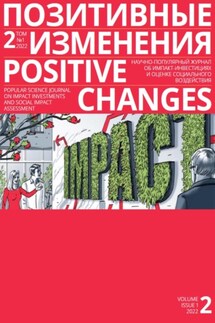Позитивные изменения. Том 1, №1 (2021). Positive changes. Volume 1, Issue 1 (2021) - страница 7
However, everyone has no inherent optimism about the prospects for implementation of a single universal evaluation system. Ekaterina Rybakova believes that it will be extremely difficult to reach an agreement even at the level of one, single country. "In many ways, the question of preferences, what exactly you consider important for a certain sphere, plays a role here," she notes. Preferences – and, we add, the traditional "devil in details". "For example, one foundation states: we invested in the project – 300 children have been taught programming. My first question is: where are these children from? If these children played chess yesterday, and today you taught them programming, how much social effect is there? If yesterday they were drinking beer in the alleyway, and you brought them to the club, got them interested so they stayed, taught them programming and gave them a profession, then there is a real social effect", – says Ksenia Frank.
In general, experts agree: an evaluation is necessary despite all its complexity. "When you create an infrastructure project, it’s ‘a venture inside a venture'", Vladimir Smirnov says. "I know that a reasonable, conscious, social community will say that this is really needed. It is very necessary – a very cool project, which really works, helps, makes. For example, in Blagosfera Center, as in the most complex project, we count this. And the numbers are quite encouraging for us.
Vladimir Smirnov
The broad scope of ‘impact investing' concept sets a predictably long running start for modeling the development paradigm. On the one hand, mainstream cases have already begun to appear on the Russian market. So, in 2020, the Towards Impact Investments accelerator was launched – the Impact Hub Moscow pilot project and the Navstrechu Peremenam Foundation, under which social projects for impact investment are selected and finalized. On the other hand, the current map of the domestic impact extends from internal social projects of large companies to models of public-private partnership and venture financing.
Thus, investors are increasingly ready to invest in the development of territories and communities and evaluate this activity as a kind of impact investment. There is potential in the sphere that will sooner or later begin to return not only with human capital, they believe. Many projects of the Rybakov Foundation are focused in this direction – About Women, About Children and others. "Community is a special relationship between people, where people are united by common values, a common working. It is being in the community that changes their lives and leads to those positive changes that begin first of all in thinking and then in actions, deeds, and quality of life."
At the same time, in the format of influence investments, public-private partnership projects are developing today, supported, in particular, by VEB (the Bank for Development and Foreign Economic Affairs). "VEB, as a development institution, has a whole direction that is dedicated to this – impact investments and impact projects," Elena Feoktistova says. In the first case, we are talking about financial participation in socially significant projects, in the second – about the creation of projects as such. "In fact, this is a private public partnership, a real entrepreneurial activity, which should ensure the return on investment. Above or below the market value – it is another story," she said.





